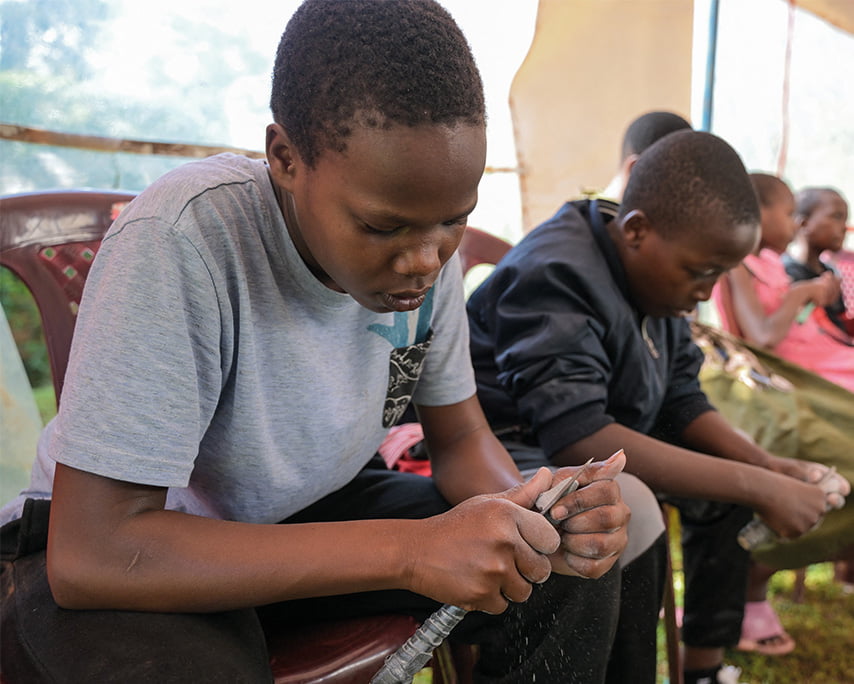Children learn how to shape stones while attending a workshop mentored by Kenyan sculptor Elkana Ong’esa (not pictured) in Tabaka, near Kisii on November 29, 2023. As Kenya’s most lauded sculptor, 79-year-old Elkana Ong’esa has seen his gigantic stone sculptures displayed all over the world -from the UNESCO headquarters in Paris to the United Nations in New York-, but believes that African art still hasn’t won the recognition it deserves, either overseas or at home.
Photo credit: Simon Maina/AFP via Getty Images
The transformative power of learning for lasting peace
In a world marked by geopolitical tensions, gender disparities, racial divides, religious conflicts and political unrest, the International Day of Education, which marked on the 24th of January, serves as a poignant reminder of the pivotal role education plays in fostering lasting peace. This year’s theme, “Learning for Lasting Peace,” underscores the profound impact inclusive and equitable quality education has on eradicating violence across geographical, gender, racial, religious and political lines. Education not only acts as a catalyst for societal harmony but also fuels sustainable development and prosperity.
Inclusive and equitable quality education as a foundation for lasting peace
Part of the foundation for lasting peace lies in providing every individual with access to inclusive and equitable quality education. Education acts as a powerful equalizer, breaking down barriers that perpetuate violence and discrimination. When all members of society have the opportunity to learn, regardless of their gender, race, religion or socio-economic status, a culture of understanding and tolerance begins to blossom.
The United Nations’ Sustainable Development Goal 4 (SDG 4) emphasises the importance of ensuring inclusive and equitable quality education for all. By prioritising education, especially for marginalised communities, a more just and peaceful world is possible. SDG 4 highlights the need to “ensure inclusive and equitable quality education and promote lifelong learning opportunities for all” as a fundamental building block for achieving sustainable development.
Advancing peace through education
As a powerful tool for advancing peace, education fosters critical thinking, empathy, and a deep understanding of diverse perspectives. When individuals are exposed to different cultures, ideas and histories, they are better equipped to appreciate the richness of human diversity. This exposure breaks down stereotypes and prejudices, laying the groundwork for peaceful coexistence.
Moreover, education empowers individuals to address societal challenges through non-violent means. By promoting dialogue, conflict resolution and tolerance, educational institutions become incubators for future leaders who prioritise diplomacy over discord. The promotion of peace education in curricula ensures students are equipped with the skills necessary to navigate the complexities of a globalised world.
Positive social impact through education
The positive social impact of education extends beyond individual empowerment to encompass entire communities and nations. Educated societies are more likely to experience economic prosperity, improved health outcomes and overall well-being. Therefore, by investing in education we invest in the future stability and resilience of societies.
Furthermore, education acts as a potent deterrent to the recruitment and propagation of extremist ideologies. Informed individuals are less susceptible to manipulation and radicalisation, reducing the likelihood of violence rooted in political, religious or ethnic differences.
As we commemorate the International Day of Education it is crucial to recognise education as a fundamental force for positive change. Inclusive and equitable quality education serves as the cornerstone for eradicating violence. By advancing peace through education, we not only contribute to the realisation of SDG 4 but also pave the way for a more harmonious, prosperous and sustainable future. Let us unite in our commitment to education as a transformative force capable of building bridges, fostering understanding and ultimately creating a world where peace prevails.



